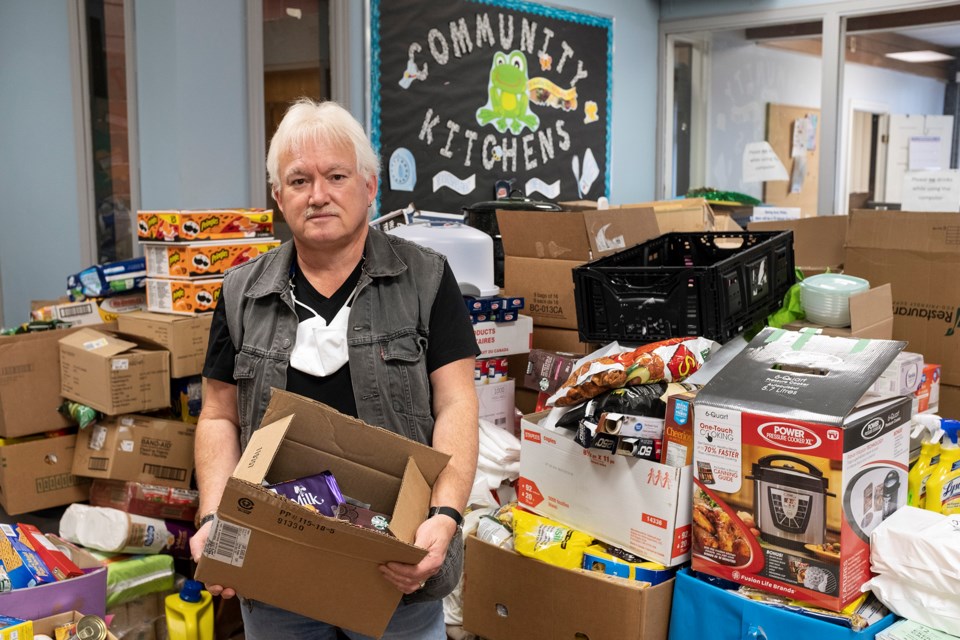Charities of all varieties and sizes across Canada are struggling to keep up with an unprecedented growth in demand, according to a recent survey shared by the Canadian Press.
The findings from a survey of nearly 3,000 Canadian charities showed more than half couldn’t meet demand for help, while nearly a third reported a significant drop in revenue as inflation and staffing shortages continue to plague food banks, resource centres, and other foundations across the country.
SooToday reached out to several local charitable organizations to see how they’re withstanding the uniquely challenging circumstances of a post-pandemic society.
Celebrating its 10th anniversary this year, Helping Hands has expanded current space on Wellington Street West in response to rising levels of demand in the community.
Providing clothing, household items, and other essentials for those in need, Helping Hands founder Wendy Gutcher says they’re now renting both levels of the former Steelton Chapel near the underpass.
“A year ago, we were operating with 2,500 square feet, but we’ve overgrown the main floor,” she says. “As of March 1, we’ve taken over the entire church – roughly 5,000 square feet.”
“We’re serving a lot more students, homeless people, and others who have left abusive relationships. Everybody’s struggling. Nobody can afford to feed their kids. We’re trying to make it as easy as possible to give them whatever they need.”
To help residents combat the rising food costs, Helping Hands is now running its Sponsor a Family program. They also have intentions to begin teaching locals how to garden, and they’ve recently began operating their own pantry shelf, which primarily consists of dry goods.
“Is it challenging? Yes,” she says. “But the donations are coming in. We get a lot of pretty nice reusable donations for sure.”
Meanwhile, St. Vincent Place recently had a huge revenue boost after the annual Coldest Night of the Year event raised over $100,000 for the non-profit.
General manager Nat Cicchelli says those kinds of community fundraisers have gone a long way in ensuring they're able to continue meeting the needs of those less fortunate.
“We’re one of the lucky ones,” he says. "The only reason why we've been successful is because the community has rallied around us."
Cicchelli says St. Vincent averages 150 takeout meals and between 35-50 hampers every Wednesday and Saturday, in addition to serving 300 kids weekly as part of their Lunches for Learning program.
In 2022, the non-profit served 16,772 meals in the soup kitchen, which was up from around 12,000 the year before.
Their food bank also helped 2,775 families in 2022 – a 40 per cent increase from the year prior.
“We crunch our dollars to make sure we get the max out of everything we purchase in order to supply the demand, which is the community members who are in need,” Cicchelli says.
Like many charities across the country, Cicchelli notes they had to let go of several employees when their emergency shelter ended in March 2021, but their volunteer numbers have remained strong.
“Our volunteer base has increased because of the new programs we’ve added,” he says. “The core staff is still here; we just wear more hats, and we have a lot more volunteers who are helping us out.”
Over at the SSM Soup Kitchen Community Centre, their team estimates they’ve witnessed a 30 per cent increase in demand.
“Those numbers are constant now,” says Soup Kitchen general manager Ron Sim. “We’ve seen upwards of 200 people per day in some cases.”
“The soaring costs of everything is at the top of our concerns. Prices seem to be going up 15 to 20 per cent every few months.”
Sim says their team has remained unchanged since the onset of COVID, and they’re looking forward to hosting their first annual ‘Tony Martin Walk for Hunger’ this June.
“Our community has been very generous, but of course we could always use more help," he says.
Coming up on their 12th anniversary, volunteers with Save Our Young Adults (SOYA) on Gore Street have seen their client base double in recent times.
Originally formed to provide programming and resources for people struggling with mental health and substance-use disorders, SOYA president Connie Raynor-Elliott says their services have vastly expanded to keep up with the ever-growing demands for those most vulnerable.
“There were times where I thought, ‘how are we going to pay for rent?’ or ‘we don’t have this or that,’ but somehow we make it work,” she says. “We're surviving and we’re very blessed.”
For Raynor-Elliott, inflation is by far the toughest challenge facing SOYA in 2023.
“We run a mini-food bank and soup used to be three for a dollar – now it’s $1.98 on sale,” she says. “The spoons we provide have gone from 4 cents a unit to 11 cents.”
“Containers for our meals used to be 42 cents, but those costs have tripled. The Water Tower Inn has supplied us with containers for a year. Without them, we’d be done because we can’t afford them.”
Raynor-Elliot and her husband budget for several hundreds of dollars out of their own pockets each month to ensure SOYA can stay in operation for the hundreds who pass through their resource centre every week.
Thanks to the generosity of the community, the president of SOYA says they’re able to continue providing their services in full, despite some of the devastatingly unique circumstances of today’s world.
“The only reason we’re here is because of our community,” she says. “Our community is very generous. The last winter alone, our last count for mittens and gloves was 1,243 pairs.”
“People are really struggling. We’re seeing a lot more seniors, new Canadians, and students. But our volunteer base has grown. A lot of volunteers come because they’ve been there, and it’s their way of giving back.”
“We all work together.”
